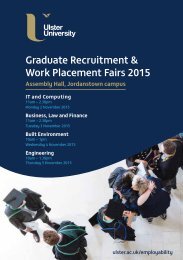Public Attitudes to Peace Walls (2015)
1RRkqqy
1RRkqqy
Create successful ePaper yourself
Turn your PDF publications into a flip-book with our unique Google optimized e-Paper software.
<strong>Public</strong> <strong>Attitudes</strong> <strong>to</strong> <strong>Peace</strong> <strong>Walls</strong> (<strong>2015</strong>)<br />
Survey Results<br />
Ulster University<br />
3. Overall Survey Results<br />
The following section sets out the survey results using a series of themed headings. In addition<br />
<strong>to</strong> the issues covered in the 2012 survey, participants were also asked <strong>to</strong> consider the term<br />
‘community consent’ and reflect on what this term meant. In a related set of questions,<br />
respondents were also asked <strong>to</strong> reflect on their interactions with the community that resided on<br />
‘the other side’ of their nearest peace wall.<br />
3.1 Length of time resident has lived in their property and opinions on the<br />
area as a place <strong>to</strong> live<br />
To allow us <strong>to</strong> understand some of the context, respondents were asked <strong>to</strong> indicate how long<br />
they lived at their current address. Table 4 indicates that the majority of respondents (54%) have<br />
lived in their property for ‘more than 15 years’. This supports evidence from the 2012 survey that<br />
indicated that people living in interface areas are mostly long-term residents (59% of respondents<br />
in 2012 indicated that they had lived in their property for more than 10 years) and survey<br />
responses are therefore based on extensive ‘lived experience’ of life beside a peace wall, including<br />
times of conflict and of relative calm.<br />
Table 4: How long have you lived at this property?<br />
Total (%) Protestant (%) Catholic (%)<br />
Less than 1 year 7 6 7<br />
1 <strong>to</strong> 5 years 17 21 14<br />
6 <strong>to</strong> 10 years 10 11 8<br />
More than 10 years 12 14 13<br />
More than 15 years 54 48 58<br />
When asked about the quality of life in their community, 24% of Catholics and 31% of Protestants<br />
emphasised the strong sense of solidarity (Table 5). This finding was consistent among people<br />
of all ages and true for both men and women. However, more Catholics (23%) than Protestants<br />
(11%) believed that their area was a good place <strong>to</strong> bring up children. It is worth noting that<br />
younger adults (13%) were over twice as likely as people over 35 (6%) <strong>to</strong> emphasise positive social<br />
networks.<br />
10




